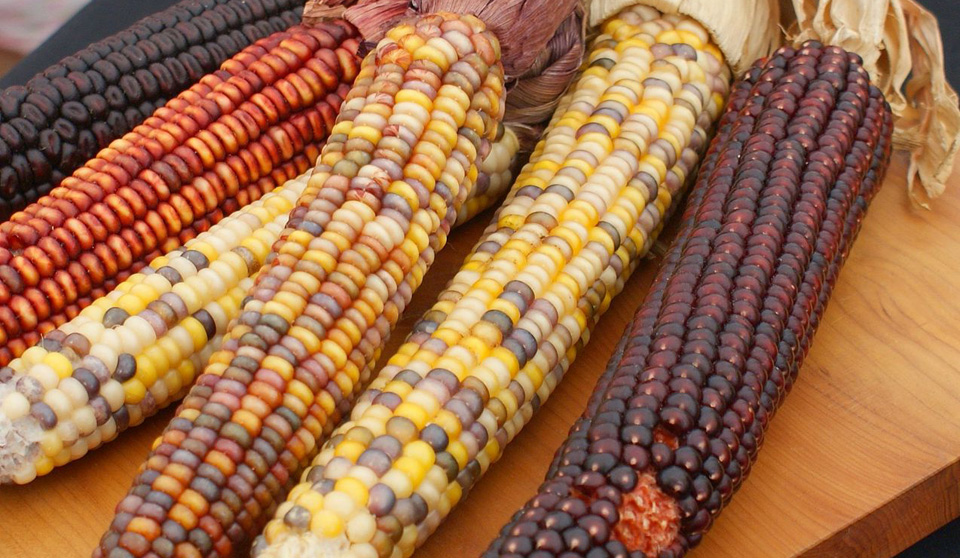
Maize Day is celebrated on the day after Thanksgiving and falls within Native American Heritage Month. It’s a day, Nov. 25th this year, set aside for anyone who eats, regardless of ethnicity, citizenship, descendants of the first peoples of the Americas or of immigrants, to celebrate the common role of maize—which the Europeans came to call “corn”—in our culture.
Even if you are not eating corn on the cob, popcorn or succotash, you are likely consuming products almost every day such as corn starch, corn flour or corn syrup, which are common ingredients in many prepared foods.
Unlike other food and plant life, maize was common across the Americas North and South. It was a central food source used by all the indigenous peoples in their everyday diet. Maize Day also celebrates other traditional crops and foods of Native Americans.
There are many varieties and colors of maize, which started out before human cultivation as a grass. Some varieties are used to make corn flour, others are best eaten on the cob, and still others are perfect for popping. Of course, anyone who’s ever eaten corn on the cob with fresh creamy butter and a pinch of salt, or roasted over the grill, knows that corn more than deserves its own holiday. And movie theaters would bankrupt without this indigenous American snack!
National Maize Day was started by artist Corinne Lightweaver in 2004. “This holiday began as a small research project through which I intended—with my family—to commemorate the United States holiday of Thanksgiving through the viewpoint of the indigenous people,” she has said.
Maize Day marks the special role it has played in food history. Maize has an ancient history and occupies central roles in many native myths and legends. In the creation stories of cultures in pre-Columbian Mexico, humans are first fashioned out of maize.
But all is not well in the world of maize.
Adelita San Vicente Tello is an agronomist with a master’s degree in rural development and a doctorate in agroecology. She is director of Seeds of Life (Semillas de Vida), a group promoting agro-biodiversity and protecting native corn. San Vicente is also a convener of the Mexico-wide food sovereignty coalition Without Corn, There Is No Country (Sin Maíz, No Hay País) and a member of the Union of Scientists Committed to Society (Unión de Científicos Comprometidos con la Sociedad).
Speaking two years ago at a celebration of Mexico’s first National Holiday of Native and Creole Seeds, she reminded her listeners that “Mexico now imports one-third of this sacred icon and staple food, mostly from the U.S. A fierce battle is being waged over corn that is still grown in Mexico, with small farmers and seed sovereignty activists pitted against Monsanto and other GMO giants, the Mexican government, the U.S. government, and the World Trade Organization.”
With NAFTA, and subsidies to agribusiness in the U.S., Mexican farmers have been priced out of the corn market, leading to the demise of small farming. When the land can no longer support farm families, inevitably people will migrate to where jobs and a livelihood promise life—to maquiladoras in the U.S.-Mexican border cities, or across to the United States. Mexico now imports 42 percent of its food.
San Vicente says that “most corn is still produced by campesin@s [small farmers]. They still use native seeds, and they use rainwater for sowing—even though they do it in soil that is very degraded and thus produces little. We consider this small-holder production to be an opportunity, because genetic reserves are stored in the native seeds. Traditional knowledge lies within them. This is really where the alternative lies for the food production model, especially when faced with the problem of climate change.”
Her organization, Seeds of Life, creates corn reserves and seed exchanges as a guard against “the risks of the dominant food system, specifically GMOs, in order to elevate health and ecological awareness among consumers.” In 2007 food activists in Mexico created a campaign called “Without Corn, There Is No Country,” which applies pressure on the Mexican government to understand “the political importance of food” and food sovereignty. Their saying is “Put Mexico in your mouth.”
Despite the movement’s public presence in demonstrations, food fairs, and petitions, the government seemingly answers only to the transnational corporations such as Monsanto and Cargill. “With the support of the government,” says San Vicente, “Cargill built ethanol-producing plants in Mexico. So now Mexico imports corn, and uses its own corn and land to produce biofuels.” The government has also approved the planting of GMO corn.
Food activists have asked the United Nations to step in, appealed to President Obama for a renegotiation of NAFTA’s agricultural clauses, and taken cases to court concerning “many human rights, including the rights to a healthy environment; to preservation of biodiversity; to fair participation by the population; to a sustainable use of the biological diversity of native corn that will guarantee its access to future generations; to adequate, nutritious, and sufficient food; to cultural rights; and to health.
“The defense of corn,” San Vicente concludes, “is not just to preserve our sacred plant. It is also fundamental to sustaining Mexico as a living genetic reserve of important varieties of fruits and vegetables that feed humanity. This great agro-biodiversity would never exist without the campesin@s who, over centuries, have fed and nurtured a proud culture which is an example for many countries.
When all is said and done, we are children of corn. It’s our life, and we need to protect it.”
For decades socially conscious Americans have had mixed feelings about the traditional Thanksgiving holiday, leading to critical questions and challenges to some of the founding myths of the nation. Recent attacks on the “water protectors” at North Dakota’s Standing Rock ask if it’s truly possible for us “all to get along.” Honoring Maize Day might help to reset our thinking about the debt we owe to indigenous culture, and about the tasks that lie ahead.
Sources: Nationaldaycalendar, Otherworlds, and others.










